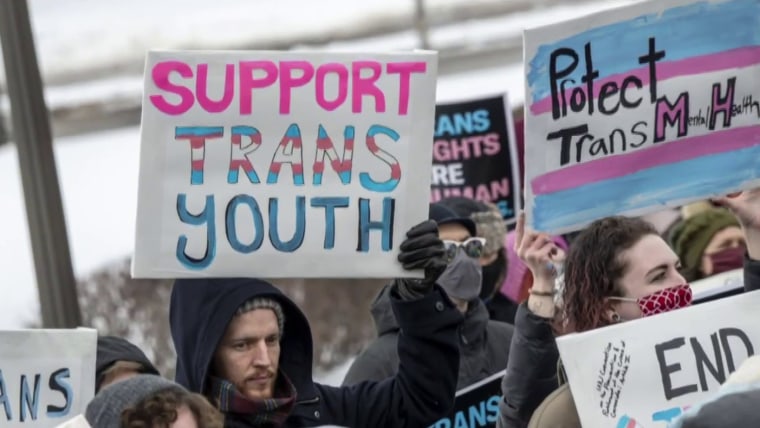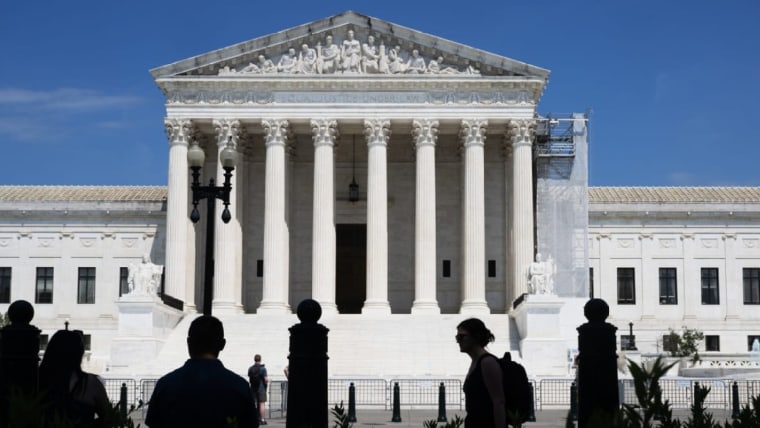It’s always dangerous business to read too much into Supreme Court justices’ questions at oral arguments, but in United States v. Skrmetti, the case of a Tennessee law that bans gender-affirming care for minors, a majority of the court didn’t appear willing to agree that the ban violates the 14th Amendment’s equal protection clause.
A majority of the court didn’t appear willing to agree that the ban violates the 14th Amendment’s equal protection clause.
That’s what the justices were being asked to decide Wednesday: whether Tennessee’s banning the use of puberty blockers and hormone treatments for minors seeking gender-affirming care, but not for minors prescribed the drugs to arrest early puberty, violates the equal protection clause.
The plaintiffs argue that the law creates a sex-based classification, most likely a violation of the equal protection clause, because Tennessee’s law allows a cisgender boy to be prescribed puberty blockers to stop early puberty but denies a transgender boy’s being prescribed the same blockers to treat gender dysphoria.
Whether the law creates a sex-based classification matters a great deal. If Tennessee’s law creates a classification on the basis of sex, then under the Supreme Court’s case law, it is subject to a type of heightened scrutiny called intermediate scrutiny, and the law is more likely to be struck down. If, instead, the law creates a classification on the basis of age, it is subject to a much lower level of review, and it is almost certain to be upheld. I didn’t hear anything Wednesday to suggest that five justices will accept the challengers’ argument that Tennessee created a sex-based classification.
That doesn’t necessarily mean all hope is lost for those seeking to challenge this law. Challengers may have more success citing a different part of the 14th Amendment, the due process clause. A challenge under this part of the 14th Amendment would focus on parents’ right to make choices about their children’s medical care, and it would follow a line of cases supporting parents’ rights to direct their children’s upbringing. To be clear, this would require challengers to bring a new challenge to the Supreme Court.
Solicitor General Elizabeth Prelogar, one of the most gifted Supreme Court advocates ever to argue before the court, may know this. She kicked off her challenge to the state law by saying that, under Tennessee’s ban on gender-affirming care, “it doesn’t matter what parents decide is best for their children.” This was, in fact, the fourth sentence she uttered.
Justice Amy Coney Barrett picked up on Prelogar’s remark and said, “Even if we decided that this wasn’t a sex-based classification that triggered intermediate scrutiny, that would not prevent parents from still asserting the substantive due process [claim], right?”
Why wasn’t Wednesday’s challenge focused on parental rights? Because Wednesday’s challengers included the Justice Department.
In 1923, the Supreme Court struck down a Nebraska law that prevented teachers in public or private schools from teaching “any modern language, other than English.” The court concluded that the law unconstitutionally interfered with a parent’s liberty interest in raising their children. Two years later, in 1925, the court struck down an Oregon law that required parents of young children to send them to public schools only. Here again, the court concluded that the law infringed on parents’ liberty to choose which schools to send their children to and, more generally, to direct their upbringing.
Why, then, wasn’t Wednesday’s challenge focused on parental rights? Because Wednesday’s challengers included both private plaintiffs (including minors seeking gender affirming care) and the Justice Department. The Supreme Court granted the Justice Department’s petition for certification, which focused solely on equal protection arguments. The Biden administration was confined to challenging this law based only on equal protection, not due process, grounds because the Justice Department joined this case under a law that applies only to challenges “seeking relief from the denial of equal protection of the laws.”

Again, a majority of the justices didn’t appear to buy the argument that Tennessee’s law is a sex-based classification. Tennessee argued that the law doesn’t create a sex-based classification because there is no difference in treatment for a boy who wants to use puberty blockers to treat early puberty and a girl who wishes to do the same. Justice Clarence Thomas and his conservative colleagues appeared amenable to this argument, and he suggested that, instead, the law created an age classification because only minors, not adults, are prohibited from receiving gender-affirming care.
The conservative justices each probed whether the classification is actually on the basis of transgender status, not sex. The challengers understandably resisted this classification, because it isn’t clear under the Supreme Court’s case law whether classifications on the basis of transgender status would get heightened scrutiny.
There was a lot of discussion by the conservative members of the court about wanting to leave these questions to the democratic process.
There was also a lot of discussion by the conservative members of the court about wanting to leave these questions to the democratic process, and specifically to elected lawmakers, not unelected federal judges. This can present a very slippery slope, however. As Justice Ketanji Brown Jackson forcefully argued, the court has long acknowledged that judges have a role to play in protecting individual rights, particularly when they are trampled on by the majority via the legislative process. There is simply no one else to protect those rights when the elected branches go too far.
The argument that judges must step in because Tennessee’s law draws constitutionally invalid lines based on sex appears to be lost. The court may be more likely to take action and protect these individual rights under an argument that this state law violates parents’ rights to make decisions about their children’s medical care.

